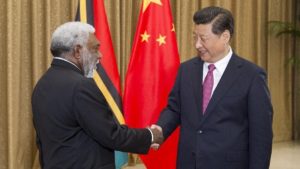Home » Commentary » Opinion » Pacific anxiety: Should we worry about China?
· Ideas@TheCentre
 China’s increasing aid and infrastructure projects in the Pacific have stirred considerable media attention. But does Beijing’s growing reach pose a valid concern for regional security?
China’s increasing aid and infrastructure projects in the Pacific have stirred considerable media attention. But does Beijing’s growing reach pose a valid concern for regional security?
A lot of the criticism has been over unsustainable debt burdens for developing regions.
According to recent data, Australia leads in ‘spent’ aid to the Pacific, with contributions totalling US$6.5 billion ($8.76 billion) between 2011 and the start of 2017, exceeding China’s by more than 5:1.
But China is coming up fast behind us, with US$4 billion ($5.5 billion) worth of aid pledged in 2017.
However, to keep this in perspective, in 2015 alone Beijing pledged US$60 billion over three years in loans and assistance across Africa.
An estimated 67% of China’s aid to the Pacific is provided through concessional (low interest) loans — a hallmark of Beijing’s foreign aid policy.
But even with the lower rates, the loans saddle developing nations with unmanageable debts, pressuring them into debt equity swaps. Elsewhere, this has seen the handover of a Sri Lankan port to China in exchange for the wiping of US$1 billion worth of debt.
Pacific nations Tonga, Samoa and Vanuatu all face significant debt pressures, with foreign debt in Tonga reaching 41% of GDP — of which 2/3 is owed to China’s Exim Bank.
While their debt burdens are far from matching Sri Lanka’s, there is valid concern that this kind of ‘debt-trap diplomacy’ could lead to Chinese acquisition of strategically positioned ports and airports — with potential for military appropriation.
Earlier this year, reports of Chinese ambitions to build a military base on Vanuatu prompted Prime Minister Malcolm Turnbull to meet with, and seek assurance from, his Vanuatuan counterpart.
A Chinese base in the Pacific could compromise US dominance of the region and seed the kind of military brinksmanship ploys used in the South China Sea.
China and Australia are jostling for favour with the Pacific. Australia is working towards a bilateral treaty with Vanuatu and just last week promised further funding for parliamentary buildings in Samoa.
But while China’s projects are fewer, they are generally larger and more headline-grabbing than Australia’s, hence its overall engagement in the Pacific can be overstated.
But as Beijing gears up its Belt and Road Initiative, there is growing potential for Pacific states to be subjected to further debt saddling and economic dependency — rendering some of our nearest neighbours vulnerable to instability and coercion.
And the unpredictable nature of US foreign policy in the Asia Pacific should simply provide more impetus for Australia to cement its role as the regional leader.
Hugh Morrison is a Bachelor of Journalism student majoring in international relations, and an intern at the Centre for Independent Studies.
Pacific anxiety: Should we worry about China?